人教版(PEP)英语六年级下册:Unit 4 《My Holiday》 时态综合题
人版(PEP)小学英语六年级(下册)课件Unit4MyHoliday

What did I do on my
holiday?
I _____________ on my holiday.
What did I do on my
holiday?
I _____________ on my holiday.
What did I do on my
holiday?
I _____________ on my holiday.
What did I do on my
holiday?
I _____________ on my holiday.
mountain
climb a mountain
climbed a mountain
I climbed a mountain on holiday.
take pictures took pictures
Where did you go on your holiday?
• I went to Beijing
Where did you go on your holiday?
• I went to shanghai
Where did you go on your holiday?
I went to Japan
Where did you go on your holiday?
• I went to America
Wednesday, April 6th,2011
知识回顾 Knowledge Review
learned Chinese
Betty
Lingling
Dear Betty, II, wtoe,ntmtoy,SShhananghghaiaio,nomn,y holiday,. went, (.) tIotooko,kmmanayn,yI,ppicitcuturerse.s, (.) II, agtoeogdo, oadtef,ofodod. (.) IT, hsaengI, sTahnegna, nanddd,awnictehd, fwriethndms,ydfarniecneds,.my,(.) EInlegalirsnhe,dI,Elenagrlnisehd., (.) wI awsa, sI,shoahpappyp, ys.o, (.) Yours, Lingling
人教PEP六年级下英语-Unit 4 My holiday知识点归纳
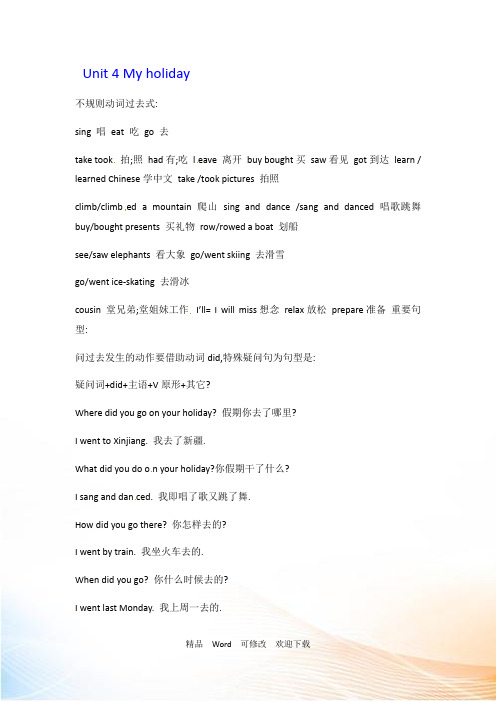
Unit 4 My holiday不规则动词过去式:sing 唱eat 吃go 去take took拍;照had有;吃l eave 离开buy bought买saw看见got到达learn / learned Chinese学中文take /took pictures 拍照climb/climb ed a mountain 爬山sing and dance /sang and danced 唱歌跳舞buy/bought presents 买礼物row/rowed a boat 划船see/saw elephants 看大象go/went skiing 去滑雪go/went ice-skating 去滑冰cousin 堂兄弟;堂姐妹工作I’ll= I will miss想念relax放松prepare准备重要句型:问过去发生的动作要借助动词did,特殊疑问句为句型是:疑问词+did+主语+V原形+其它?Where did you go on your holiday? 假期你去了哪里?I went to Xinjiang. 我去了新疆.What did you do o n your holiday?你假期干了什么?I sang and dan ced. 我即唱了歌又跳了舞.How did you go there? 你怎样去的?I went by train. 我坐火车去的.When did you go? 你什么时候去的?I went last Monday. 我上周一去的.It was a long holiday. 这是一个长的假期. For the last day of the holiday, we relaxed and prepared to go back to work or school.Exercise for Unit 4一写出下列动词的过去式.have takeclimb二. 补全对话.A: _____________________________________ ?B: We went to Shanghai on our holiday.A: ____________________________________ ?B: We went by plane.A: ___________________________________ ?B: We visited the East Pearl and shopped.A: __________________________________ ?B: Yes, we had a good time there.A: Are you going there next year?B: ______________________. It’s really interesting there. I want to go there again.三用所给词的适当形式填空,把句子补充完整.1. Linda____________________ ( visit) his uncle next January. Her uncle __________ (work) in Harbin. It often ____________ (snow) in winter there. It’s much ______________(cold) than her city.2. David ________________ (buy) some beautiful _______________ ( present) forhis friends in Beijing last Sunday. He _______________________ ( give ) then at the party next Monday. Al ice ______________ ( like) ________________ ( draw) . She _____________________ ( get ) a box of colour pencils.3. Wher e ___________ you ____________ ( go) on your holiday?I _______________ (go) to Guangzhou and I _____________ (eat) some good food.4. George often _______________ (have) bread for breakfast. But he ___________(have) some noodles this morning.5. What_________ your father __________(do)? He ________ (be) a teacher.Where___________ he work? He ____________ (wor k) in a middle school.6. My cousin ____________ (not go ) to the cinema last night. Because he __________(be) ill . He ___________ ( stay) in bed all the night.。
人教版(PEP)六年级下册英语四种时态复习

人教版六年级英语四种时态复习四种时态复习一般现在时的基本概念一般现在时表示现在经常反复发生的动作、存在的状态或习惯性的动作的时态。
常见的标志词(时间状语)主要有:every…, sometimes, at…, on Sundays, uauslly often, never, always等。
一般现在时的结构be动词的一般现在时主语+ Be动词+ 其他成分I am a boy.实义动词的一般现在时主语+ 行为动词+ 其他成分We study English.一般现在时的具体形式be动词的一般现在时1.第一人称单数I+amI am a student.2. 第二人称单数you和其他人称复数we/you/they+areYou are a lucky girl.We are students in this school.3. 第三人称单数he/she/it+isShe is my teacher.例题:用be动词的适当形式填空。
1. I from China.2. It very hot today.3. They in the hospital.4. We good students.5. She a beautiful girl.实义动词的一般现在时1.第一、二人称单数I/you和其他人称复数we/you/they+动词原形I get up at 8 o’clock.They go to school everyday.2.第三人称单数he/she/it+实义动词第三人称单数形式It runs fast.He studies hard.例题:用说给单词的适当形式填空。
1. We home every day.(go)2. Trees green in spring.(turn)3. He very hard.(study)4. The boy up at seven O'clock.(get)5. The earth round the sun.(move)补充:主语为第三人称单数形式,谓语动词的变化规则:一般现在时的句型变化be动词的一般现在时肯定句否定句He is a worker. 主语+ be动词+ not + 其他He is not a worker.一般疑问句特殊疑问句Be动词+ 主语+ 其他特殊疑问词+ 一般疑问句-Is he a worker?Where is he?-Yes, he is. / No, he is not.例题:写出下列句子中所缺的be动词,并用肯定及否定形式回答。
2024年六年级英语下册全册课件人教版PEP

2024年六年级英语下册全册课件人教版PEP一、教学内容Unit 1 How tall are you?Unit 2 Last weekendUnit 3 Where did you go?Unit 4 My holidayUnit 5 What does he do?Unit 6 How do you feel?Unit 7 Summer vacation plans二、教学目标1. 掌握并运用描述身高、体重、假期活动、情感状态等相关的词汇和句型。
2. 能够用英语谈论过去的事件、活动以及将来的计划。
三、教学难点与重点教学难点:时态的运用,尤其是过去时和将来时。
描述性词汇和复杂句型的构建。
提高听说能力,特别是在具体情景中的应用。
教学重点:掌握各单元的核心词汇和关键句型。
能够运用英语进行日常交流,表达个人观点和经历。
四、教具与学具准备多媒体教学设备教学PPT单元词汇卡片实物或图片辅助教学学生练习册和作业本五、教学过程1. 导入:通过情景对话、歌曲或游戏引起学生对单元话题的兴趣。
利用实物、图片等辅助教具引导学生预测本节课内容。
2. 新课内容展示:呈现并讲解新的词汇和句型。
结合实际场景进行例句演示。
3. 实践活动:分组进行角色扮演,练习对话。
个人或小组活动,完成随堂练习。
4. 巩固环节:通过游戏、竞赛等形式复习所学内容。
教师引导学生进行口头或书面反馈。
梳理本节课所学要点。
强调语法点和语言运用。
六、板书设计板书将突出每个单元的关键词汇、句型和语法点。
使用不同颜色粉笔,区分重点和难点。
图形、表格等直观展示,帮助学生记忆。
七、作业设计1. 作业题目:根据Unit 17每个单元的内容,设计相关的词汇填空、句型转换、短文写作等练习。
例如,Unit 1: Write a short passage about your best friend, including their height and weight.答案将附在作业后面,便于学生自我检查。
PEP小学英语六年级下册Unit 4 My holiday-精品课件

Love,
LinLi
1
2
3
4Байду номын сангаас
go learn see eat row buy have is take
saw went learned rowed ate had was took bought
Dear Amy, had went saw rowed ate bought was learned
How are you ? Last weekend I to Shanghai by
plane .I fun with my mother and father. We
to a zoo and
monkeys. We
a boat and
saw foreigners(外国人) in the park. They
by plane by ship by train by bus by car
LinLi
On my holiday, I went to…
Choose any phrases you like:
saw elephants rowed a boat took pictures went ice-skating bought presents ate good food climbed a mountain went fishing
Chinese. At noon, we went to a restaurant and
good food. After that, I
some presents in the
shop. I
tired but I was happy. I'll go and see
you tomorrow.
小学英语PEP人教版小学英语六年级年级下册《Unit 4 My holiday》ppt课件2

Friday
Last Friday I went to school by bus. How did you go to school last Friday?
I went _______________.
Harbin
Where did you go on your holiday, Mike? How did you go there? What did you do there?
Where did you go on your holiday, John? How did you go there? What did you do there?
the Great Wall Tian’ anmen
Where did you go on your holiday, Amy? How did you go there? What did you do there?
When did Zoom go there? He went there in his dream(梦). How did he go there? He went there by spaceship. What did he see? He saw Chang’e, the rabbit and the tree.
Let’s talk
1.Where did Sarah go on her holiday?
She went to Harbin.
2.How did she go there?
She went by train.
3.What did she do?
She went skiing.
Where did you go on your holiday? I went to _______.
pep人教版小学六年级英语概念(四个时态) 总复习
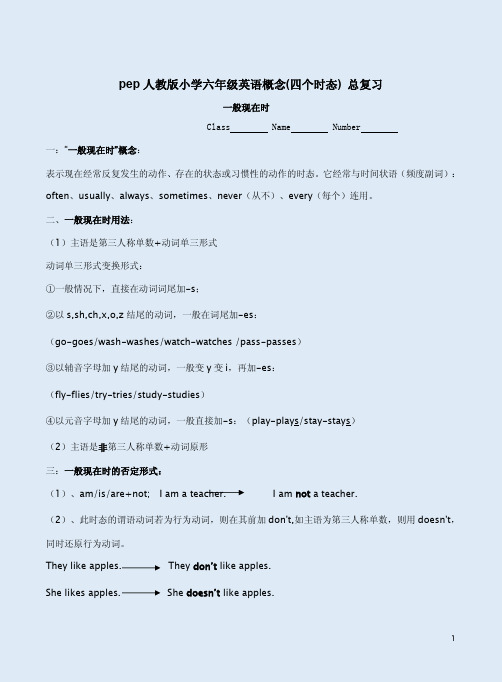
pep人教版小学六年级英语概念(四个时态)总复习一般现在时Class Name Number一:“一般现在时”概念:表示现在经常反复发生的动作、存在的状态或习惯性的动作的时态。
它经常与时间状语(频度副词):often、usually、always、sometimes、never(从不)、every(每个)连用。
二、一般现在时用法:(1)主语是第三人称单数+动词单三形式动词单三形式变换形式:①一般情况下,直接在动词词尾加-s;②以s,sh,ch,x,o,z结尾的动词,一般在词尾加-es:(go-goes/wash-washes/watch-watches/pass-passes)③以辅音字母加y结尾的动词,一般变y变i,再加-es:(fly-flies/try-tries/study-studies)④以元音字母加y结尾的动词,一般直接加-s:(play-plays/stay-stays)(2)主语是非第三人称单数+动词原形三:一般现在时的否定形式:(1)、am/is/are+not;I am a teacher.I am not a teacher.(2)、此时态的谓语动词若为行为动词,则在其前加don't,如主语为第三人称单数,则用doesn't,同时还原行为动词。
They like apples.They don’t like apples.She likes apples.She doesn’t like apples.四:如何改一般疑问句:①把be动词放于句首;He is a student.Is he a student?②用助动词do/does提问—动词还原—句末变问号。
☆还需注意细节变化:如my-your、many-any等。
They like apples.Do they like apples?She likes apples.Does she like apples?一般过去时1.一般过去时表示过去某个时间发生的动作或存在的状态,常和表示过去的时间状语连用。
六下Unit4 My Holiday知识小结与运用
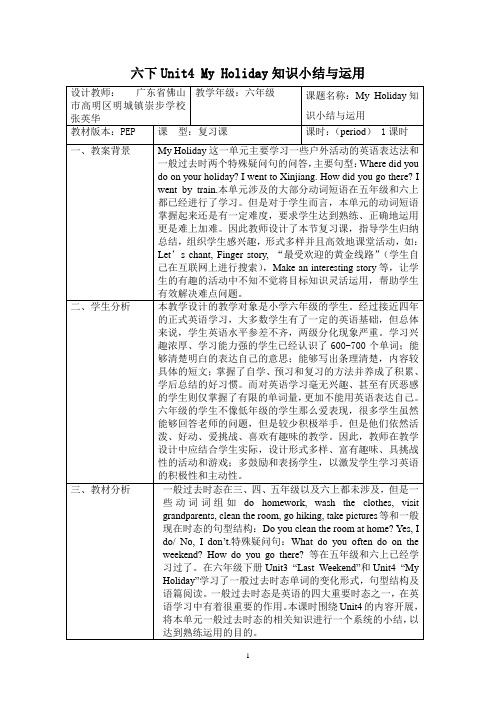
六下Unit4 My Holiday知识小结与运用教学过程内就能够进入到学习过去时态的状态中。
/xe/jszx/tbjx zy/hdsc/PEPhdsc/PEPdzkb6x/2010Blackboard design:Unit4 My Holidaylearned Chinese sang and danced Where did you go on your holiday? took pictures climbed mountains I went to …ate good food bought presents What did you do there?rowed a boat saw elephants I …went skiing/ ice-skating How did you go there?I went by …Story: It was Saturday…教学反思在本节课的教学设计中,我结合教材和学生的特点,依据新英语课程标准精神,从激发学生的学习兴趣、培养良好的学习习惯、丰富生活经验和提高认知水平出发,科学安排教学内容,合理设计教学任务,开展形式多样的教学活动,让学生亲身体验,大胆实践,积极参与,共同合作交流,帮助学生在任务型的教学途径下发展综合语言运用能力,使语言学习的过程成为学生形成积极的情感态度、主动思维和大胆实践、提高跨文化意识和形成自主学习能力的过程。
在教学过程中,关注每一个学生的情感,激发他们学习英语的兴趣,帮助他们建立学习的成就感和自信心,突出以学生为主体的教育思想,尊重个体差异的不同,关注教学过程中的评价活动,以极力学习兴趣和培养自主学习能力发展为目标开展教学活动。
本节课是复习课,主要复习一般过去时态动词的过去式以及根据情境或实际情况用过去式句型进行问答,最后学生能够运用过去式句型写一篇过去发生事情的短文。
六年级的学生已经在五年级学习了本单元涉及到的动词短语,在六上Unit3 Last Weekend也已经接触了一般过去时态。
四大时态重点笔记(素材)人教PEP版英语六年级下册

时态时态(一)1、简介英语的时态(Tense)是一种动词形式,不同时态用于表示不同时间与方式。
它是表示行为、动作、状态的各种时间条件下的动词形式,一共有16种时态。
常用的有12种,如下面表格中黑字部分。
其余4种(红色字体)需要与从句搭配使用,将在从句部分进行描述。
2、主要四种时态本章节先学习四种时态:•一般现在时:do /does,最近都会发生的相同的动作(表示常态平常,总是,老是这样)•一般过去式:did,动作在过去发生•一般将来时:be going to do,动作还未发生(有准备,打算的意味)。
•现在进行时:be doing,动作正在发生(正在进行的动作)3、句子的公式针对四种基本时态,句子的公式疑问词+ 时表词+ 主语+ 句剩+ 动词+ 其他【注】主语是动作的发起者,宾语是动作的承受者,句剩只有在一般将来时才用!【例句】1、你刚才去哪儿了?Where did you go?2、你平常都什么时候回来?When do you come back?3、你在吃什么?What are you eating?4、你怎么跟他说的?How did you tell him4、人称相关它it it its its itself他们They them their theirs themselves 【注】此表格格外重要,不要忽视!!!时态(二)1、简介•时态和句子结构清楚后,开始造句,按句子类型分为陈述句和疑问句。
•陈述句又分为肯定句和否定句;疑问句分为特殊疑问句和一般疑问句。
2、一般疑问句与特殊疑问句一般疑问句疑问词时表词主语句剩动词其他Do you know himDid You see herAre you going to eatIs he working特殊疑问句How do you know him Where did You see herWhen are you going to eatHow is he working【注】1、不可以延续的动词(例如:come来,go去,leave离开,arrive到达,start/begin开始)可用现在进行时表将来Are you going to New York = Are you going to go to New York?2、Who和whom的区别:who用于主语或者宾语,whom只能用于宾语。
人教PEP英语六下Unit4MyHoliday教案第5课时
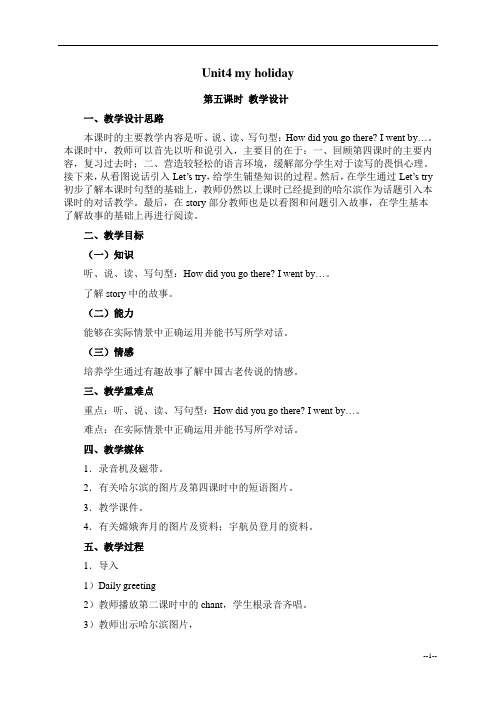
Unit4 my holiday第五课时教学设计一、教学设计思路本课时的主要教学内容是听、说、读、写句型:How did you go there? I went by…。
本课时中,教师可以首先以听和说引入,主要目的在于:一、回顾第四课时的主要内容,复习过去时;二、营造较轻松的语言环境,缓解部分学生对于读写的畏惧心理。
接下来,从看图说话引入Let’s try,给学生铺垫知识的过程。
然后,在学生通过Let’s try 初步了解本课时句型的基础上,教师仍然以上课时已经提到的哈尔滨作为话题引入本课时的对话教学。
最后,在story部分教师也是以看图和问题引入故事,在学生基本了解故事的基础上再进行阅读。
二、教学目标(一)知识听、说、读、写句型:How did you go there? I went by…。
了解story中的故事。
(二)能力能够在实际情景中正确运用并能书写所学对话。
(三)情感培养学生通过有趣故事了解中国古老传说的情感。
三、教学重难点重点:听、说、读、写句型:How did you go there? I went by…。
难点:在实际情景中正确运用并能书写所学对话。
四、教学媒体1.录音机及磁带。
2.有关哈尔滨的图片及第四课时中的短语图片。
3.教学课件。
4.有关嫦娥奔月的图片及资料;宇航员登月的资料。
五、教学过程1.导入1)Daily greeting2)教师播放第二课时中的chant,学生根录音齐唱。
3)教师出示哈尔滨图片,T: Where did I go last winter? Do you remember?…T: Yes. I went to Harbin. How did I go there? Guess?…让学生猜测各种交通工具后,T: I went there by train.T: Where did you go on your holiday?…T: How did you go there?…首先让学生在实际语言运用中了解本课时句型。
人教PEP版英语六下unit4myholiday课件之五

2.切面包
活动过程: 将Let’s read中部分句子,写到 卡纸上,句子中的单词之间没有间隙, 你能通过仔细 朗读和拼读进行识别.并把句子根据 单词切开吗.
看限定时间内谁切的面包最多.
3.制作明信片
贺卡有很多种类,朋友身体不适可以送安慰卡; 朋友心情不畅可以送幽默卡; 失败送鼓励卡;成功有庆贺卡;出行有平安卡.
贺卡除了有纸制的,也有电子贺卡. 明信片也可以通过电子邮箱的方式来发送。
创设情境:
如果你出行在外,想向父母或朋友报平安, 并简单介绍你的旅游的情况,你会怎样设计你的明信片.
要求: 根据每个学生的不同情况,可以制作纸制的明信片,
也可以发送电子邮件. 制作明信片的同学,收集自己喜欢的旅游景点和风景图
片.把卡纸剪折成明信片的样子,然后把图片贴上去. 填写假日旅行的内容,并写上寄信人及收信人的地址和姓名.
活动结束时,留在台上的同学为最佳小特工, 他所在小组为最佳特工小队.
7.长鼻王
发挥你的想象力,对词组和句型进行滚动练习. 可以适当扩大一点课外的相关内容.
Eg: I went to the restaurant. I ate chicken, beef, mutton, …… I went to the zoo. I saw the animals.……
l
Chant
What did you do on your holiday? What did you do on your holiday? I took, took pictures.
What did you do on your holiday? I climbed, climbed a mountain.
人教版六年级下 Unit4 My holiday
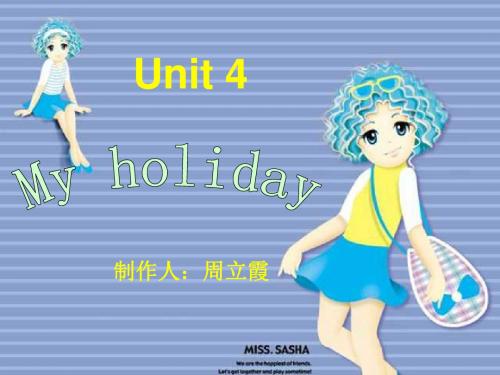
词汇
learn--- learned take--sing--- sang dance--eat--- ate climb--buy---bought row--see--- saw go---
l
took danced climbed rowed went
What did you do on your holiday?
It was a long holiday. We left Beijing on February 1st and got to Harbinon the 2nd . On the first day, I went to a park with my parents On the 3rd,I went skiing.On the 4th ,I did my homework.On the 5th,
Dear mom, How are you? Every day I had fun with
my cousins. On Monday we went to a restaurant. We ate good food. On Tuesday we went to a park. We sang and danced. On Wednesday we played ping-pong. On Thursday we climbed a mountain. We took mang pictures,. Tomorrow I’ll be back home! Miss you and dad. Love, John
1. What did John do on Monday? He went to a restaurant.
2. What did John do on Wednesday? He played ping-pong.
- 1、下载文档前请自行甄别文档内容的完整性,平台不提供额外的编辑、内容补充、找答案等附加服务。
- 2、"仅部分预览"的文档,不可在线预览部分如存在完整性等问题,可反馈申请退款(可完整预览的文档不适用该条件!)。
- 3、如文档侵犯您的权益,请联系客服反馈,我们会尽快为您处理(人工客服工作时间:9:00-18:30)。
1 时态复习综合练习 姓名:
一、选择正确的答案。
1 Did you _____ a big meal last night ? A eat B eating C was eating D ate
2 I ______ Luocun last Sunday and _____ to Shanghai on Monday .
A leave , get
B leaves , got
C left , got
D leaving , get
3 Mike can ______ well , he ________ very weekend .
A sing , sing
B sang , sang
C sing , sings
4 Mike ______ pictures there , let ’s ask him to take some pictures for us .
A tood
B takes
C is taking
5 Did you _____ some presents ? No , I didn’t , but I _______s ome this evening .
A bought , bought
B buy , bought
C buy , am buying
D buy , am going to buy 6 What is your brother ’s hobby ? --- He _____ playing the violin .
A liked
B is going to like
C like
D likes
7 John ___ English now , He _______ English at 6:30 every mor nig .
A read , read
B reads , reads
C is reading , reads
D is going to read , is reading 8 Can you ________ a kite? ---- Yes , I can . Look ! I ______ a kite for my sister .
A fly , flew
B flew , fly
C fly , am flying
D flying , am going to fly
9 Last night , Sarah ____ to a bookstore to ______ some books .
A went , bought
B went , buy
C goes , buys
D is going , buying
10 A: What did you do last night ? ----- I _____ some books .
B : Are you ____ computer games tonight ? Yes , I am .
A readed , playing
B readed , going to play
C am reading ,played
D read , going to play
二、根据图片或提示完成句子。
1 2 3 4 5 1 What is Chenjie doing now ? _______________________________________________ 2 What is John going to do next weekend ? _______________________________________ 3 What did the girl do last Sunday ? _____________________________________________ 4 What can Chenjie do ? ____________________________________________________ 5 What does Mike usually do on the weekend ? __________________________________
三、 请读懂短文的意思,根据括号里的动词提示用正确的时态补充短文。
John is a helpful boy . He ____( do) eveything (任何事情) he can . Every morning , he ____(go) to school on foot . After school , John ______ (do ) housework for his mother . He can _______(clean) the room and _______ (empty) the trash . Last evening , his mother _____(is) ill , he_______( cook) dinner and ________(wash) the dishes . Tomorrow is Saturday , he
_____(go ) to the hospital with his mother . Do you think John is a good boy ?。
